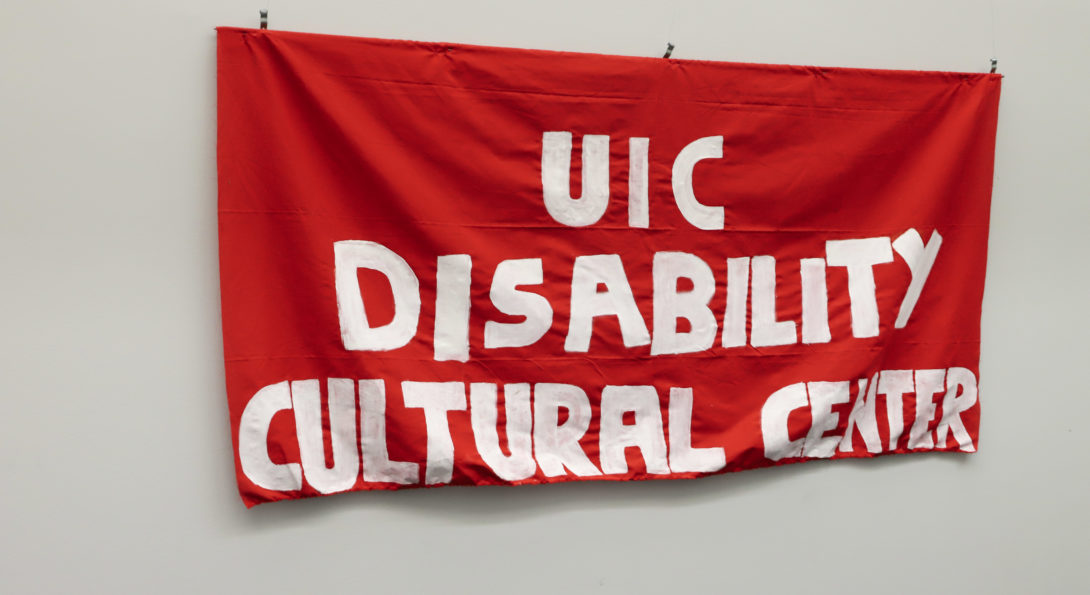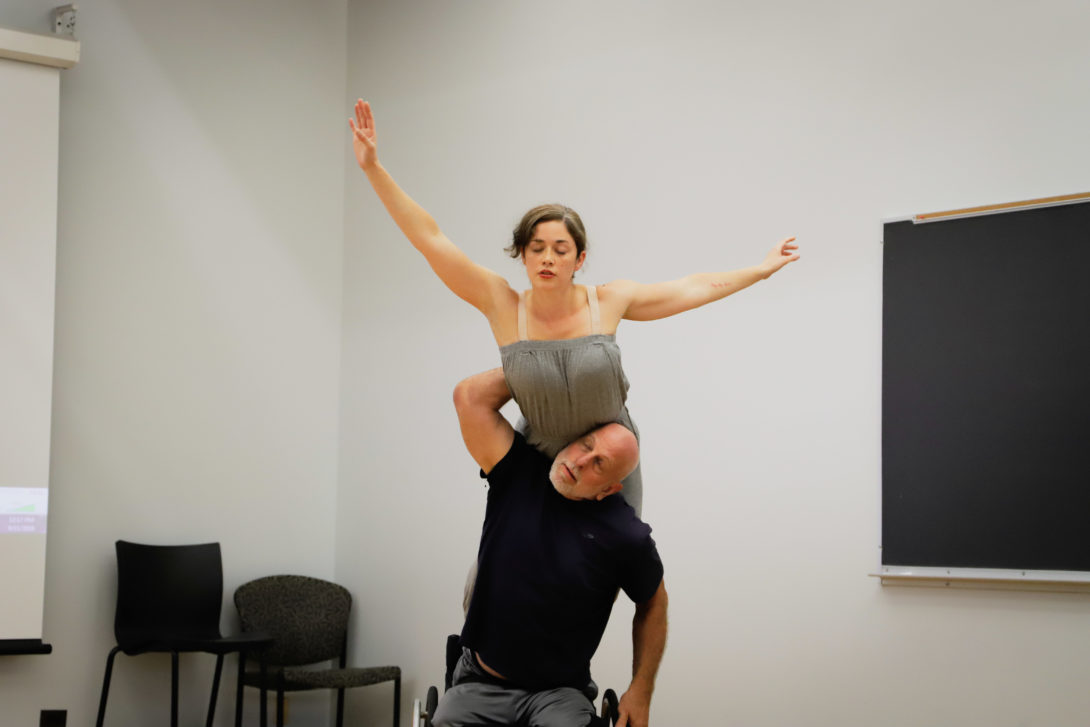UIC Welcomes the Disability Cultural Center

Nothing About Us, Without Us
The University of Illinois at Chicago (UIC) welcomes the much-anticipated Disability Cultural Center (DCC) on its campus. Led by Roxana Stupp, former Director of the Disability Resource Center (DRC), the DCC strives to support and foster community building among students, staff, and faculty who identify as persons with disabilities or as disabled. Joining the Centers for Cultural Understanding and Social Change, the DCC is open to all who are interested in its mission and initiatives. Currently located on the first floor of the Richard J. Daley Library, the DCC opened its doors to the public on September 11, 2018, with a magnificent program featuring Dr. Carrie Sandahl, with a presentation entitled "What is Disability Culture?," and performances by leading Chicago artists with disabilities, including Nura Aly, Timotheus Gordon, Arlene Malinowski, Kris Lenzo, and Anita Kenney.
A Brief History
When UIC’s Office of Diversity was created in 2012, the Disability Resource Center (DRC) became part of the Centers for Cultural Understanding and Social Change (CCUSC). Informed by an understanding of disability as a part of diversity, this move aimed to address the clear need for a center that focused on the disability perspective. As DCC Director Roxana Stupp explained:
“[Disability] is a human experience […] It was a great moment on campus to also start talking about disability as diversity. The broader perspective, the larger picture, is to not only open a space for students, but also have an open space for staff and faculty. Accessibility, [alongside] human diversity, is about the commitment of the University to add accessibility to equity. To me it was important to put the two things together.”
The desire to create a community space for persons with disabilities on campus, as well as the legal necessity to accommodate students in the classroom, led to further conversations during the 2017-2018 academic year about how to best meet these needs. As Caryn Bills, Associate Chancellor for the Office for Access and Equity (OAE), puts it “[…] accommodations and interactions with faculty, staff, and students [are] a legal requirement, which is for students with disabilities that have to be accommodated in the academic environment.” As a result of these conversations the DRC became part of the Office for Access and Equity (OAE) in order to deal exclusively with accommodations, and the DCC was created in late February of 2018, under the Office of Diversity, with the goal of providing greater resources for programming and other support for people with disabilities on campus.
Quote 1
Disability is a human experience. It was a great moment on campus to also start talking about disability as diversity.
| DCC Director
The Creation of a “New” Center
The DCC was thus conceptualized as a further resource for people with disabilities to create and share a safe and informative space. Lily Diego, DCC staff and PhD student in Disability Studies adds, “we particularly want to emphasize that there are different experiences in disability and some of them are not apparent, and these are also part of the experience that we want to bring into the center. The center is open to all people on campus—also to those who don’t identify as a person with a disability. We want everyone to be here and meet with us.”
Brian Heyburn, also a DCC staff and PhD student in Disability Studies, states that intersectionality is very important to the work of the DCC. A term first coined by legal scholar Kimberlé W. Crenshaw, intersectionality refers to the ways in which intersecting forms of oppression are experienced. “We want to be sure that, in our center and our work, we are sensitive of the broader experience of identity,” says Heyburn. One of the goals of the DCC is to highlight the intersections among disability and other social identities, and to explore these connections through art and cultural programming in collaboration with the various Centers for Cultural Understanding and Social Change at UIC.
UIC’s strong activist history and its mission “to foster scholarship and practices that reflect and respond to the increasing diversity of the U.S. in a rapidly globalizing world” also support and guide the work of the DCC. Regarding this, Stupp explains “[…] our center is institutionalized. This means that we are part of the Office of Diversity and answer directly to the Chancellor and the Provost. In that respect our location really projects to the rest of the University. The fact that UIC is a model that embraces this initiative at the highest level of administration is a great opportunity that we have. We have a lot to do now to develop our vision for this center, but we are in the right place because we can communicate with other students through our connection to the other Cultural Centers. UIC is unique [in] that way—we are a public university and we are linked to the highest level of administration.”
Quote 2
We want to be sure that, in our center and our work, we are sensitive of the broader experience of identity.
| DCC Staff
Disability Resource, Disability Cultural

Being a new resource for people with disabilities, the DCC will continue to work alongside the DRC to expand services for students, staff, and faculty. For instance, the DCC and DRC would like to see the development of a mentoring program for incoming undergraduate students. Through such an initiative, Stupp explains, the DCC “can help [students in developing] a sense of self and become part of a community.” Classroom inclusivity remains a topic of significant concern as Stupp notes “some students encounter oppression, discrimination, and stigma in the classroom and that is really closely connected to culture. Not everything is about accommodation. So definitely I’m so happy that the Office of Diversity will have an impact in the classroom.”
At the DRC, the staff is happy to see the DCC opening their doors to students, faculty, and staff. “It’s been great to see that the cultural piece [is continuing] with the Office of Diversity so that there can be better programming for students and staff—better understanding of the culture and the inclusivity that should exist. I think that with [Associate Chancellor and Vice Provost for Diversity] Amalia Pallares’ leadership, and those that are serving at the Cultural Center, [we] will see a rapidly growing center in the upcoming months” states Bills, Associate Chancellor for the Office for Access and Equity (OAE).
Danielle Earls, Assistant Director for the Office of Access and Equity, also notes the importance of the new cultural center, “I think the Cultural Center… [is] a space for students to study, gather, or just hang out. The current configuration of the DRC wasn’t inclusive to create that community so I think that’s a huge advantage of the DCC with having that ability to create a space for students and having the DRC really focusing on top notch student services so that we are able to implement those services and accommodations and make sure that they are getting all the support that they need in their academic elements, while the DCC are focusing on that cultural component.”
Communication and collaboration between the DRC and the DCC will remain essential as both units seek to better serve the disability community at UIC. As Earls explains, “Last week we had some students who were on campus and asked to have a buddy introduce them to campus buildings, and while that wouldn’t be an official accommodation, we can work with the DCC where students who are part of that community would be ready to volunteer to give services in another way. There are also people that inquire about student groups or opportunities to create them specifically around an identity whether it is a specific disability like autism or ADHD. I think that the DRC can help in building that with the DCC. So that when a student comes to us we can say ‘oh, we have that resource on campus’ and it doesn’t have to be general tutoring, it can be specific to your identity. I see a great collaboration to offer those services that might not fall under the umbrella of compliance accommodations.”
The DRC is committed to supporting an environment where students feel like they can successfully navigate the university setting and work on building a shared identity. Earls also credits student advocates for the changes that are happening on campus, “I think that the students are very active in how to shape the DRC and the DCC and we have that strong student voice for advocacy and I think that’s important to build a community and create that culture.” Adding to that sentiment, Bills says “we care deeply about this community and the students with disabilities have the right and deserve access to everything on this campus and we will ensure that they will have that.”
Programming and Further Collaboration

Since its establishment, the DCC has been busy planning various initiatives and programming series. One series is called “In Our Own Words: Conversations Matter.” Through conversations on various topics such as “Got my Syllabus: Now What?” and “What’s the Word? Ableism in Everyday Language,” the DCC aims to foster spaces for intentional, open, and respectful dialogue while continuing to further critical understandings of disability.
Another series is “Disability Page Turners,” which highlights authors with disabilities who address disability narratives. This semester’s pick is Good Kings, Bad Kings by Susan Nussbaum, which won the PEN/Bellwether Prize for Socially Engaged Fiction and the Washington Post described as “not only shin[ing] a light on a segment of society often ignored, in art as well as life, but also is a really great read.” Check out the book from the library and join the first meet-up on September 20th. This is meant as a flexible reading space where students come and talk about the themes addressed in the books and explore how portrayals of people with disabilities may or may not resonate.
Beyond these various initiatives, the DCC hopes to deepen the relationship with UIC’s Disability Studies Program and to further explore the connections between disability and culture. As noted by Heyburn, “Disability Studies […] sees disability as complex relationships of disability with their surroundings. Also, Disability Studies has its roots in disability activism. There is always that strong link with the broader disability community…. I see a Disability Cultural Center, in some ways, as an application of Disabilities Studies scholarship.”
Both Heyburn and Diego note that Disability Studies is a profoundly interdisciplinary field, attracting scholars from a variety of disciplines who are interested in exploring the experiences of people with disabilities, while placing disability within social, political, and economic contexts.
Within UIC’s Department of Disability and Human Development, the program on Disability Art, Culture, and Humanities (PDACH), directed by Dr. Carrie Sandahl, has played a central role in bringing disability art to campus through its engagement with Bodies of Work. In conjunction with Dr. Sandahl’s work, the DCC has also established a relationship with UIC’s Gallery 400, which is currently exhibiting “Chicago Disability Activism, Arts, and Design: 1970s to Today.”
Reaching the broader UIC community is also an important aspect of the work at the DCC, and staff is currently putting together a lecture series addressing topics related to disability. This series hopes to expand the understanding of disabilities here on campus and challenge how we see disability beyond the classroom—including our perceptions of visible and invisible disabilities.